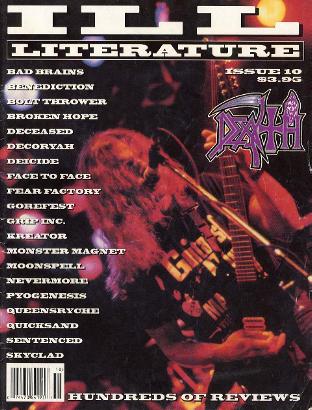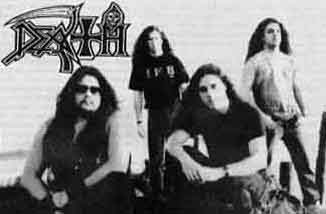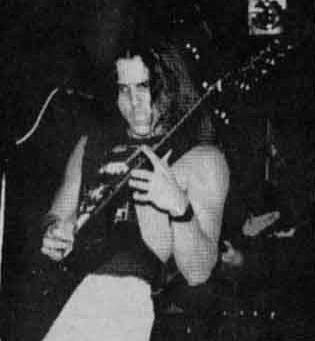| |

|
Chuck Schuldiner, for all
intents and purposes, is a veritable metallic icon of sorts
- a sole pioneer of gargle-throated vocals and rapid-fire
musical brutality collectively hailed as death metal. Take
your pick of any genre currently in fad, but certainly give
Schuldiner and ex-Death members Rick Rozz and Kam Lee (nucleus
of Massacre, another stalwart pioneering death metal band
based in central Florida... but that is another long-winded
story) their devilish due for single-handedly blueprinting
death metal to its current acceptable status. In all modesty,
Schuldiner politely brushes the "pioneering" accolades
so commonly associated with Death
aside.
"I just keep the tradition
going, that's all," he politely shrugs. "Bands like
Slayer, Hellhammer, Angelwitch, Venom, Mercyfull Fate, those
were the true pioneers of this genre, not to mention all those
other killer metal bands of the early '80's like Metallica
and Diamond Head. It's really depressing to think that most
of these bands no longer exist. Who's going to provide up
and coming metal bands with musical influence?" he rhetorically
asks. "Who's going to carry the torch?" Almost instantaneously
another influential band of Schuldiner comes to mind.
"Manowar
is God! I can't wait for the new lp to come out and kick some
ass! I still faithfully listen to all that stuff, very frequently
I might add. I'm looking at a huge stack of records right
now, old Fate, Savatage, Nasty Savage. It's sad when bands
decide to call it quits or, as the current trend, cave in
to eventual corporate nonsense. It's as if they consciously
disappoint their fans. Death wants to re-open the idea of
unlimited musical potential within a seemingly limited musical
genre. That's what the 70's and, to some degree, the early
80's were all about. There were so many categories derived
from particular musical styles, labels and overall image but
everything seemed to gel very nicely."
|
|
Contrary to popular belief,
Death is a Florida-based metal band; more so than ever with
the recent addition of resident musicians Bob Koelble (ex-Azrael)
and Kelly Conlon on lead guitar and bass respectively. Granted,
drummer Gene Hoglan still resides in sunny California, Chuck
is nonetheless excited when referring to Death as a true Orlando-based
band.
"Bobby lives just
a few streets away," he says, pleasurably admonishing
the musical sobriety Death's newly amassed lineup currently
receives. "Making Death, at least three fourths of it
anyway, a local band has something I wish it could've happened
a long time ago. It's really cool to have musicians in your
band living in your hometown. It's as if Death suddenly creates
this strange vibe of togetherness, especially when Gene's
in town because all of us hang out together and do "band"
things, so to speak."
|
|
"I initally met Bobby years ago when I was in high school,
he was friends with some people I knew, Bobby was a killer
guitar player back then, and he's even better now! When we
were recording Individual Thought Patterns (1993)
I tried to contact Bobby several times but was unsuccessful.
John and Brain from (the local band) Pain Principle eventually
hooked us together. Those guys are more or less Death's connection
to the local musicians," he laughs, adding that Schuldiner's
newfound musicians referral service was also responsible for
recruiting Conlon."Kelly
totally rages. Bobby's a killer shredder! Gene and I are so
psyched to have two wonderfully talented musicians in Death.We're all positive individuals
with a common goal and, more important, for the first time
the members of Death are on the same musical wavelength. We
admire the same killer metal bands, yet we're musically influenced
by different musical styles.Bobby is really into the jazz/fusion
type of music. I love early 80's metal, but above all we're
friends united in the common cause-metal music. It's hard
to keep an allegiance to metal music these days because there's
so many outside pressures prone to influencing you and your
music."
|

|
The unsaturated humility and
effervescent pride bristling from Chuck is quite refreshing
indeed. Those familiar with Death's ongoing battles with
various industry moguls, label executives, so-called "managers",
booking agents, promoters, etc., can fully appreciate Schuldiner's
adamant and repeated adherence to heavy metal music. He's
to be admired and, quite frankly, commended for his steadfast
consistency in what he believes in. The point is best illustrated
by The Metal Crusade, perhaps a well-deserved and properly
timed fan club created especially for the band's worldwide
admirers, a personally symbolic pinnacle representing that
dreaded "o" word, namely, "organization",
a mute anomaly definitely lacking in Death's repertoire
these past seven or eight years, though not any particular
fault of Schuldiner.
"Dude, it's really
cool to have some real organization, finally! The fan club
is really kicking some serious ass for us. We're getting
tons of killer letters from fans wondering what the heck
happened to us. We do read our mail, contrary to popular
belief," he mechanically illustrates. "And we
write back when we can. The overall response from the fans
is positive. It's really gratifying to hear first hand what
people really think about Death. Most of the letters received
are from Europe, Poland especially," he continues.
"Apparently people in Poland and Eastern Europe are
so starved for metal music, it's greatly appreciated over
there. It really surprises people when I personally answer
their letters. It's important for us to keep in touch with
the fans, y'know, to find out what they're listening to
and their overall attitudes toward current trends of music.
It gives us encouragement when fully encompassing other
people's concerns about Death."
What most surprised
Schuldiner is the fans' general concern for his personal
wellbeing and overall health, both mental and physical and
the admiration for Death's in-built passion for staying
decidedly brutal for each successive release since the monumental
Scream Bloody Gore reared its ugly head over eight
years ago.
"People have always
respected the overall honesty conveyed in in our music and
lyrics, which is totally cool because it just re-enforces
our commitment to stay focused on what we need to do. There's
been so many trends in music, especially in heavy metal,"
he says rather glumly. "Recently everybody's tentative
about embracing a new style of music and, naturally, they're
wondering exactly what Death will do next. Individual...
had a major impact on us from an exposure point of view,
it really took people by surprise."
Perhaps contributing
to Death's seemingly endless rise in popularity among mainstream
metal heads worldwide was the eclectic video for "The
Philosopher," which constantly aired on MTV's Headbanger's
Ball. The video captured the group's lyrical essence. Unfortunately
the video also received some external negative feedback,
courtesy of the very popular Beavis and Butt-head, who mercileslly
ripped into Death in the animated duo's usual abrasive manner.
"Yeah, totally!
It was a total drag at first," admits Schuldiner. "Believe
it or not, that actually helped us! They ragged on us pretty
bad but hey, they're only cartoon characters. At first it
didn't really bother me at all. What really bothered me
is that they didn't dig the video. I mean, for all the crazy
stuff they do and dig, you'd think a group named Death would
be favorable. Sure, they ended up raggin on us but so what.
Who cares? The person who writes that show obviously doesn't
listen to metal that regularly, though I found out later
that they requested the video from Relativity (Death's previous
label, but more on that later) so obviously I can't blame
them. People come up to me and say, 'hey, I just saw you
on Beavis and Butt-head... it was so cool!' so, in a way,
it just exposed more metal fans to Death's music.
Speaking of exposure
to a new audience, Schuldiner excitedly mentions that Death's
new release, entitled Symbolic, will undoubtedly
brutalize once again the uncensored pomposity currently
filtered among hordes of anxiously awaiting death metal
fanatics.
"I'm very pleased
about the whole thing," says Schuldiner rather excitedly.
"I've never been this excited about a Death record.
We've put a tremendous amount of effort and labor into this
one, believe me. Now that I'm able to finally sit back and
'objectively' assess the whole LP, it's definitely a positive
product resulting from the numerous changes we went through
this past year."
One of the many changes
incurred by Death was the band's choice of producer. Scott
Burns, who more or less single handedly produced the group's
previous four efforts was unavailable, which prompted Death
to recruit Morrisound owner Jim Morris as the harbinger
of Death's unique brand of blasting brutality.
"Things didn't
work out schedule-wise with Scott, so my first choice was
Jim. He's worked with different artists over the years -
not necessarily death metal bands, either... in order to
create a recording difference we needed to match our initial
ideas with a producer familiar with the concept of diversity.
Jim really crushed on this lp, he really opened things up
for Death. We went in with plenty of ideas and Jim more
or less brought everything to life, but, most importantly,
he brought our conception of what we wanted to a level of
personal satisfaction. He's definitely a major-league producer,
that's for sure. I'd love to work with him again on the
next record. Plenty of heavy metal bands are initially tentative
about recording at Morrisound for fear of catching that
infamous 'death metal band syndrome'," Schuldiner continues.
"If you know what you want and, basically, are aware
of your band's overall identity, then it's easy to avoid
the aforementioned cliche usually associated with contemporary
death metal bands. There's a lot you can do at Morrisound,
but as I said, we went in with our instruments sounding
exactly the way we wanted, that's why this record, though
different in some production aspects, still sounds like
Death but in a way exhibits that bit of musical diversity
I mentioned earlier."
"I'm sincerely
trying to break down barriers commonly associated with this
style of music. I'm tired of lables an tags... so called
limits and other bothersome cliches used to describe Death's
music," he adamantly insists. "I still want Death
to be remembered as a metal band first and foremost, though
it's still up to critics and journalists to further classify
us as so. I think there's many classificantions and categories
that go hand in hand with a specifically targeted genre
of music. I'd like to avoid that if at all possible, but,
as you know, it's extremely difficult."
Difficult, in a sense,
that Symbolic methodically annihilates the aforementioned
label "barriers" Schuldiner would very much like
to crush. Death's destructive approach to senselessly brutalizing
intensity brings back haunting memories of Leprosy
(1988), yet the technical precision on display mirrors the
group's more recent releases Human and, of course,
Individual Thought Patterns. By filtering Death's
incessant rapid evolution of salient musical adeptness it's
only fair to mention that Symbolic exhibits an
explosive repertoire of instrumentation on every track.
For example, the eight minute "Perennial Quest"
features Schuldiner picking acoustic guitar - a landmark
achievement in Death's music.
"I always wanted
to put some acoustic guitar in Death's music," admits
Chuck. "Acoustic guitar almost signifies a different
mood. Our main concern was to keep everything real - not
to overgloss the natural sounds of our instruments with
overused, and quite frankly, overdone electronic compression
filters. The material and lyrics are straight from the heart,
so, in essence, the production must mirror that exact feeling."
What's
most impressive is Schuldiner's concious decision to slightly
"alter" his already brutalizing vocal style. His
trademark devilish growls still exist, but take a much different
form in higher-pitched screech with a tad more audible sensitivity.
|
"Hopefully
it's not too drastic a change, I just wanted to experiment
by expanding musically, that's all. There's not too many
things we can alter and still retain that essence which
is expected of us", he says, citing contemporary death
metallers Cannibal Corpse's recent vocal style alterations
on 1994's The Bleeding.
"(Corpse vocalist) Chris (Barnes) is moving around
quite a bit on that last record which, to me, was totally
surprising but also very cool. It's important to evaluate
Death's vocal style from time to time. The vocals are probably
the most limiting aspect of our music, that's why moving
around from pitch to pitch was a conscious decision to make
things a little more dramatic. Plus, as always, I'm trying
to get the lyrics across more clearly - that in itself,
is a never-ending goal."
Another "change" in Death's overall stress-free
environment is the long-awaited severed ties with Relativity
- a blessing if not timely relief, which in spite of continuous
financial aspects notwithstanding, pleases Schuldiner to
no end."Dude, you have no idea how happy I am to no
longer have Death enslaved to Relativity. Roadrunner is
treating us right - that, in itself is a huge worry off
my mind. I initially thought this record would belong to
Relativity - a horrifying thought which made me depressed
and, quite frankly, very angry. The thought of wasting this
record on a lable that has no interest whatsoever - not
to mention no metal promotions department - really worried
me to no end. They couldn't even promote Death when they
had a metal department! Our deal with Roadrunner is a basic
cross-over/option deal. They more or less purchased our
option record, which is this one from Relativity so, in
a sense, we belong to Roadrunner. I couldn't be happier
because both the band and lable have a good understanding.
We're hoping that a solid, fulfilling relationship continues."
|

|
Perhaps the case of transition
is further assisted by Roadrunner's familiarity with Death,
the European-based label has helped promote the band in
Europe these past few years. However, the obvious question
arises concerning Death's tendency to lean towards another
independent lable rather than a major.
"Of course it's
a valid concern, but at the same time I continually hear
horror stories from bands hopelessly exploited by the corporate
powers of major labels. Sometimes it pays for an underground
band to be signed to an independent label that's "masssive"
in a sense. A label can have zillions of dollars and still
be unwilling to filter that money toward your career for
reasons completely unknown or absurd. Being on a major label
infamiliar with marketing metal music is very dangerous.
I feel confident in the move we made, besides we've worked
with Roadrunner before when we toured Europe and they've
totally kicked ass. What's really killer about the whole
scenario is the complete resurgence of Death's positive
outlook," he says confidently. "All our problems
seem so distant, but that's not to say there's plenty of
space available for future obstacles to surface. Believe
me, it never, ever ends. Put it this way - there's never
a dull moment with Death," he laughs.
Fan support, says Schuldiner,
has been Death's saving grace these past eight years, and
has kept the group's life blood flowing consistently throughout.
Death's most recent local "exposure", was the
highly successful Death for Life Benefit held last December.
A rather "unofficial" record release party for
the hometown fans, the benefit, sponsored by Death, as well
as various merchants, raised over $3000 for local chariots
B.E.T.A. and The National Multiple Sclerosis Society, and
allowed area fans to hear the new record before anyone else.
"We've always
wanted to do something like that, and believe me, before
it's said and done, we're going to do a lot more,"
Schuldiner says. "It was the first ever record release
party Death's sponsored for the hometown fans, it was interesting
to unite various people for a common cause - a good cause,
nonetheless. We spent considerable time and effort promoting
the event and it turned out very well. It's our way of saying,
"Yes, we do really care about what's going on in our
community". My mom works for B.E.T.A. (Birth, Education,
Training and Acceptance) and I know first hand that the
organization really needs help - as do many local chapters
of nationally sponsored charities. If we can make a difference
financially or otherwise - even if it's just creating a
mutual awareness, then all the hard work is well worth the
effort. I guess it gives a sense of purpose to people like
us - y'know, long-haired youths who play in heavy metal
bands and like listening to music. We do have value in society.
We'd love to sponsor more benefits for other charities as
well, it's fun and it gets people talking."
Perhaps the most anticipated
event, at least in the underground, is the possibility of
a Death/Massacre tour.
"It's been suggested
many times and quite frankly, it's certainly not out of
the question," says Schuldiner rather evasively. "Who
knows? Anything is possible these days. I really dig the
new Massacre. I haven't heard the finished album yet, just
the demos Rick (Rozz) played for me when we were at the
Dio concert and it sounded killer. I remember when we first
started back in 1983. It was just Rick, Kam and myself -
we didn't even have a bass player back then. That's when
we recorded Mantas' Death by Metal demo in my mother's
garage on that old Panasonic radio (which by the way is
still in the possesion of Rick Rozz who still uses it to
record Massacre practices, but that's another story). Those
were some good old days - actually I think about those times
quite often. Though we've certainly come a long way since
those early days, it seems like things were a lot simpler
back then."
Thomas Garcia
|
|
|